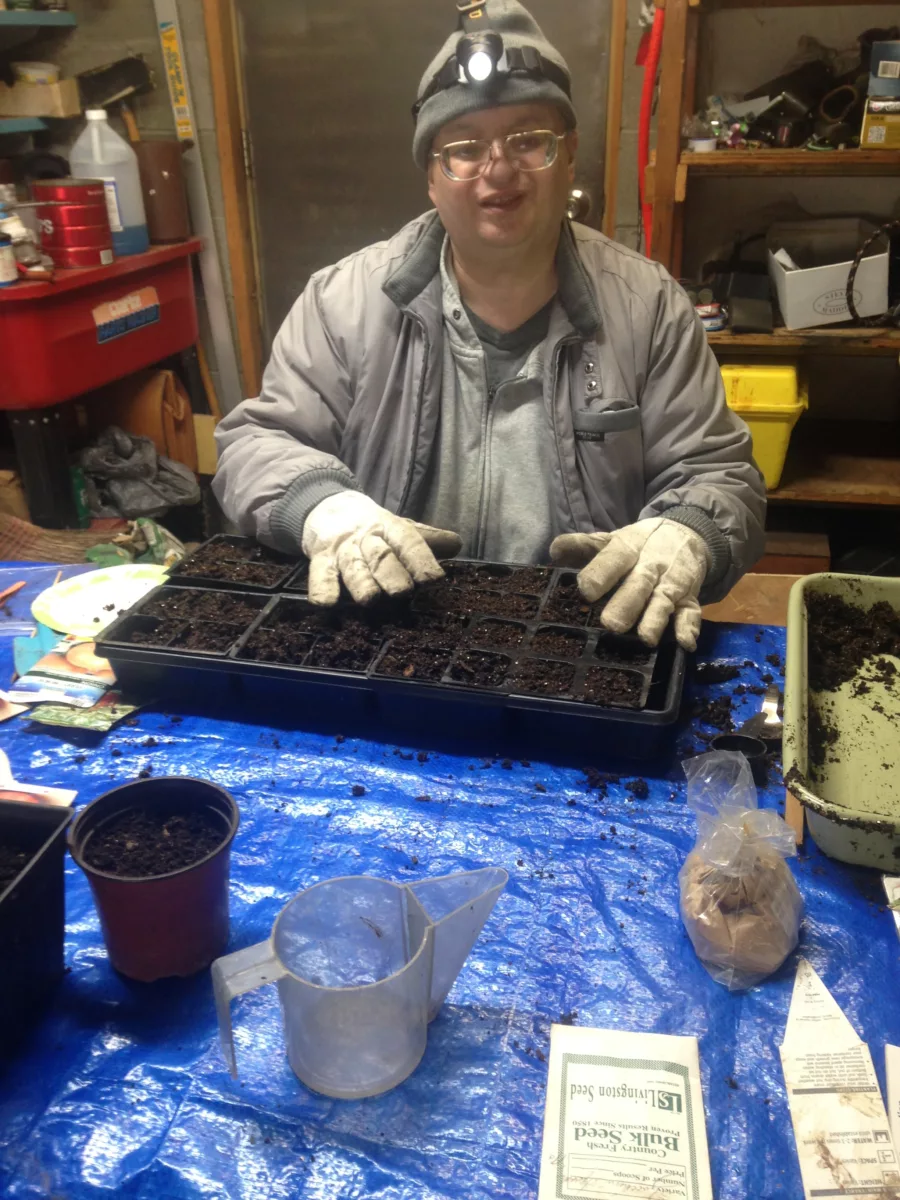Pittsburgh Jail Let Autistic Man Die Due to Culture of Neglect, Lawsuit Says
Last year, 57-year-old Anthony Talotta allegedly contracted sepsis and died after a stint in the Allegheny County Jail. His family is now suing—and says his death is part of a systemic culture of medical neglect at the facility.

The family of a 57-year-old, intellectually disabled, and autistic man who died at Pittsburgh’s Allegheny County Jail filed suit on Tuesday, alleging that atrocious medical care at the facility caused his death.
Anthony Talotta arrived at the Allegheny County Jail (ACJ) in September 2022 after being arrested at a group home he had been living in. About a week and a half later, he was dead. The lawsuit, filed by the Abolitionist Law Center and a local law firm on behalf of Talotta’s estate, claims that pervasive medical neglect at the jail contributed to his preventable death. The Pittsburgh Institute for Nonprofit Journalism has published multiple investigations into the jail—revealing systemic neglect of detainees’ health needs and a lack of transparency.
The complaint alleges the jail’s medical provider, the nonprofit Allegheny Health Network (AHN), routinely deprives detainees of basic medical care, leading to catastrophic consequences, particularly for those with disabilities. According to the complaint, of the 17 people who died between March 2020 and Talotta’s 2022 death, almost 90 percent were—or should have been—identified as needing chronic care.
“And for incarcerated persons who simultaneously had either mental illness or neurodevelopmental disorder with some other chronic care needs, the culture that AHN and Allegheny County created at the ACJ guaranteed that those individuals were discriminated against, and that their medical needs were not met,” the complaint states.
In response to emailed questions, spokespeople for Allegheny County and AHN told The Appeal they do not comment on litigation.
At the time of Talotta’s arrest and incarceration, he had been living in group homes since his mother’s death less than 10 years earlier, said attorney Alec B. Wright, who is representing Talotta’s estate.
On September 9, 2022, Talotta was cooking pasta at a group home when a staff member told him he wasn’t allowed to cook. The details are unclear, but Wright said an altercation ensued. A pot of boiling water appears to have fallen on Talotta’s foot, causing second-degree burns, torn ligaments, and fractures in his foot. Someone then called the police.
When law enforcement arrived, the officers unsuccessfully tried to dissuade the staff from pursuing charges against Talotta. Police took him to the hospital and then to jail, Wright said.
Wright said Talotta, who had an IQ of just above 60, had never been arrested before. During his jail intake in the early morning of September 10, he told a nurse, “I’m feeling pretty scared.”
Medical staff recorded in their notes that Talotta had “severe mental retardation, autism, anxiety, [and] depression.” They also wrote that he “appeared to be vulnerable and very child like [sic],” according to the complaint. The complaint states that he had also been diagnosed with diabetes and hypertension.
Some jail staff appeared to believe that Talotta was manipulative and dishonest.
“He attempted to blame his behaviors on his ‘Autism,’” the jail psychiatrist wrote, according to Wright. The psychiatrist also wrote that staff reported he was “childlike at times, exaggerating his symptoms and appearing to be very needy.”
On September 11, Talotta was sent back to the hospital, where doctors put a splint on his broken foot and gave him crutches. But when he returned to the jail, staff allegedly took those two medical devices away because they were not allowed in the mental health unit.
Cultures of Talotta’s wound collected at the hospital showed he had three bacterial infections. But the suit alleged that he received no care for his wound at the jail.
On September 13, Talotta went back to the hospital. Doctors gave him an antibacterial cream, liquid soap, gauze, dressing, and other items to care for his wound. But when he returned to the jail, medical staff confiscated these items, according to the complaint.

From there, Talotta’s condition continued to deteriorate.
On the evening of September 20, Talotta was reportedly found unable to speak and clutching his chest. Sitting on a bench in the common area, a physician at the jail gave him allergy medication and ordered him back to his cell, Wright told The Appeal. But Talotta couldn’t walk. An officer and another detainee helped him back to his cell. Less than three hours later, Talotta was found on the floor of his cell, convulsing and foaming at the mouth, Wright said.
The staff called paramedics, who took Talotta to the hospital. While there, the complaint says Talotta was discharged from jail—a move Talotta’s attorney says was designed to skirt accountability for what happened.
“It’s one of the practices of the Allegheny County jail so that they can misrepresent reporting and cause less paperwork,” Wright said. “When somebody like [Talotta] gets taken to [the hospital], they fill out a single page form that says we release him from custody. And as soon as they do that they no longer have to report the death—in their minds and it’s not true—as being an in-custody death.”
Wright said jail staff called Talotta’s family and told them Talotta had been released and was at the hospital.
“They don’t know what the situation is,” Wright told The Appeal. “What they walk into is their comatose family member who’s been intubated. Machines are keeping him alive.”
Talotta never regained consciousness. The next day, he was pronounced dead. According to his hospital report, he was diagnosed with sepsis, a potentially fatal condition that occurs when a bacterial infection enters the bloodstream. Hospital staff recorded serious secondary diagnoses, including kidney failure, respiratory failure, diabetic ketoacidosis, and cardiac arrest.
An autopsy by the Allegheny County Medical Examiner’s Office stated that Talotta’s death was natural and caused by heart disease.
Tanisha Long, a community organizer with the Abolitionist Law Center, told The Appeal that Talotta is one of the Allegheny County Jail’s numerous victims. In addition to issues with medical care, Long said correctional officers often ignore detainees’ requests for medical care or accuse people of lying about their symptoms.
“We have one man who has a—the thing’s at least the size of a baseball–hernia sticking out of his stomach,” Long said. “We have an individual whose arm was broken by COs, and he’s unable to receive any sort of pain medication.”
Long said that, while detained at the jail, Denzelle Kendrick struggled to receive medications for sickle cell, a chronic, life-threatening disease. In December 2022, another detainee recorded Kendrick experiencing a medical crisis and uploaded the videos to YouTube. Kendrick’s mother saw the footage.
“No medical aid was rendered while my child was unresponsive,” she said in a January press release. “This is totally neglectful.”
In July, 59-year-old Douglas Bonomo died at the Allegheny County Jail, prompting local protests. According to local news reports, Bonomo had been housed in the jail’s mental health unit while he waited months for a bed at a state-run psychiatric hospital. The county medical examiner found that Bonomo had choked to death on a paper towel. That same month, a survey of the jail’s healthcare workers showed that more than 90 percent of respondents agreed that the conditions at the facility could “threaten” their licenses. The following month, the county controller released an audit revealing severe understaffing for correctional and healthcare workers as of December 2022.
“Once you go behind those bars, you lose any ability to control your medical situation,” Long said. “The only way we’re going to change the system is if the jail commits to full transparency or we just straight up find a way to get that ourselves because this is not working.”
